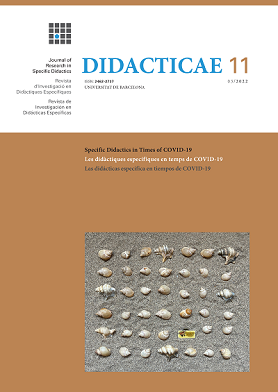El trabajo práctico de laboratorio en clase de Ciencias Naturales durante la pandemia: Experiencias en Argentina y Colombia
Practical laboratory work in Natural Sciences class during the pandemic: Experiences in Argentina and Colombia
DOI:
https://doi.org/10.1344/did.2022.11.99-115Keywords:
practical work, lab, natural sciences, pandemic, COVID-19Abstract
Teaching Natural Sciences, considering the experimental nature of these disciplines, incorporates practical lab work (PLW) as a fundamental didactic strategy. For this reason, when emergency remote education was established indefinitely in the context of the pandemic, the question arose as to what decisions the natural sciences teachers were making regarding the PLW. This article presents the responses of 35 Colombian professors and 51 Argentine professors to a survey carried out to find out their opinions and actions on carrying out PLW in this context. The results show that the teachers adapted their teaching strategies, relying on available digital resources and rethinking the objectives, in order to carry out experimental activities. However, they also identified some practices that are irreplaceable in their face-to-face mode, regarding the planned curricular goals, especially in higher education. Teachers proved to be very sensitive to the implications of their students’ socioeconomic conditions, particularly in rural contexts where there is no internet access. Consequently, the teachers themselves assumed the cost of certain practices. The impact on science education of this PLW modality during the pandemic remains to be further explored.
References
Angulo, F. (2002). Aprender a enseñar ciencias. Análisis de una propuesta para la formación inicial del profesorado de secundaria, basada en la metacognición. [Tesis doctoral. Universidad Autónoma de Barcelona, España]. http://hdl.handle.net/10803/4693
Caamaño, A. (2003). Los trabajos prácticos en ciencias. Editorial Graó.
Canavarro-Benite, A.M. y Machado-Benite, R.C. (2009). O laboratório didático no ensino de química: uma experiencia do ensino público brasileiro. Revista Iberoamericana de Educación, 48(2), 1-10. https://bit.ly/3GdZPJp
Cerecero Medina, I. (2018). Propuesta de un nuevo modelo: Práctica Reflexiva Mediada. Innoeduca. International Journal of Technology and Educational Innovation, 4(1), 44-53. https://doi.org/hd4b.
Hernández-Sampieri, R.; Fernández-Collado, C. y Baptista-Lucio, P. (2014). Metodología de la investigación (6.a ed.). Editorial Mc Graw Hill.
Lacolla, L. (2012). La representación social que los estudiantes poseen acerca de las reacciones químicas y su incidencia en la construcción del concepto de cambio químico [Tesis doctoral. Universidad de Burgos, España].
Ley de Educación Nacional Nº 26.206. (2006). República Argentina. Consultado el 10 de junio de 2021. https://bit.ly/3KXdaJI
López-Rúa, A. M., Tamayo-Alzate, O. E. (2012). Las prácticas de laboratorio en la enseñanza de las ciencias naturales. Revista Latinoamericana de Estudios Educativos, 8(1), 145-166.
Ministerio de Educación Nacional. (2019, 03 de abril). Sistema Educativo Colombiano. Consultado el 10 de junio de 2021. https://bit.ly/3re01Ek
Morales, L. M., Zorrilla, E. G. y Mazzitelli, C.A. (2020). Repensando nuestra práctica docente: la evaluación, una instancia del proceso educativo de la que no podemos prescindir. Boletín Educar en la incertidumbre: 7.ª edición. Universidad de Antioquia.
Sánchez-Moreno, A., Jaimes-Gómez, O., Jiménez-Rojas, F., Magallán-Muñoz, C.O. y Álvarez-López, J.L. (2016). Diseños experimentales caseros para la enseñanza de conceptos electromagnéticos en el Tecnológico Nacional de México. Revista Iberoamericana de Educación, 70(2), 45-62. https://doi.org/hfds
Siso-Pavón, Z., Briceño, S., Alvarez, C. y Arana, J. (2010). Las prácticas de laboratorio en la formación del profesorado en química. Un primer acercamiento. Revista Electrónica Diálogos Educativos, 9(18). https://bit.ly/3o9JEqj
Tamir, P., García-Rovira, M. P. (1992). Características de los ejercicios de prácticas de laboratorio incluidos en los libros de texto de ciencias utilizados en Cataluña. Enseñanza de las Ciencias, 10(1), 3-12. https://bit.ly/3IUlRD4
Werner-Da Rosa, C. y Becker-Da Rosa, A. (2010). Discutindo as concepções epistemológicas a partir da metodologia utilizada no laboratório didático de Física. Revista Iberoamericana de Educación, 52(6), 1-11. https://doi.org/hfdt
Wood, D., Bruner, J. S. y Ross, G. (1976). The role of tutoring in problem solving. Journal of Child Psychology & Psychiatry & Allied Disciplines. 17(2), 89-100. https://doi.org/bj3656
Downloads
Published
Issue
Section
License
Copyright (c) 2022 Fanny Angulo Delgado, Alejandro Calle Restrepo, Carlos Soto Lombana, Erica Zorrilla Ladstatter, Claudia Mazzitelli

This work is licensed under a Creative Commons Attribution-ShareAlike 4.0 International License.
The authors who publish in this journal agree to the following terms:
- Authors retain copyright and grant the journal the right of first publication.
- Submitting a paper does not involve paying any fees.
- Texts will be published under a Creative Commons Attribution Share-Alike 4.0 International License that allows others to share the work, provided they include an acknowledgement of the work’s authorship, its initial publication in this journal and the terms of the license.
- When citing works published in Didacticae, both the autor and the journal must be cited.
- Didacticae does not accept any responsibility for the points of view and statements made by the authors.



